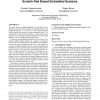Free Online Productivity Tools
i2Speak
i2Symbol
i2OCR
iTex2Img
iWeb2Print
iWeb2Shot
i2Type
iPdf2Split
iPdf2Merge
i2Bopomofo
i2Arabic
i2Style
i2Image
i2PDF
iLatex2Rtf
Sci2ools
135
click to vote
CASES
2003
ACM
2003
ACM
Compiler-decided dynamic memory allocation for scratch-pad based embedded systems
This paper presents a highly predictable, low overhead and yet dynamic, memory allocation strategy for embedded systems with scratch-pad memory. A scratch-pad is a fast compiler-managed SRAM memory that replaces the hardware-managed cache. It is motivated by its better real-time guarantees vs cache and by its significantly lower overheads in energy consumption, area and overall runtime, even with a simple allocation scheme [4]. Existing scratch-pad allocation methods are of two types. First, software-caching schemes emulate the workings of a hardware cache in software. Instructions are inserted before each load/store to check the software-maintained cache tags. Such methods incur large overheads in runtime, code size, energy consumption and SRAM space for tags and deliver poor real-time guarantees just like hardware caches. A second category of algorithms partitions variables at compile-time into the two banks. For example, our previous work in [3] derives a provably optimal static a...
Related Content
| Added | 05 Jul 2010 |
| Updated | 05 Jul 2010 |
| Type | Conference |
| Year | 2003 |
| Where | CASES |
| Authors | Sumesh Udayakumaran, Rajeev Barua |
Comments (0)

